#Detroit Publishing Company
Explore tagged Tumblr posts
Text

Plaza Hotel. Grand Army Plaza and W. 58th Street. New York, Manhattan. Circa 1907. "
Phoro: Detroit Publishing Company.
View full size
62 notes
·
View notes
Text

Postcard of the Swiss Alps
Canton of Valais, 1905
rayeshistory.com
0 notes
Text

Secrets of Black Art, The Devil's Legacy to Earth's Mortals
Or; The Sciences of Magic, Witchcraft, Alchemy, Demonology, Omens, Mesmerism, Necromancy, etc. Published by Johnson Smith & Company, Detroit, Michigan. Undated, c. 1899.
135 notes
·
View notes
Text





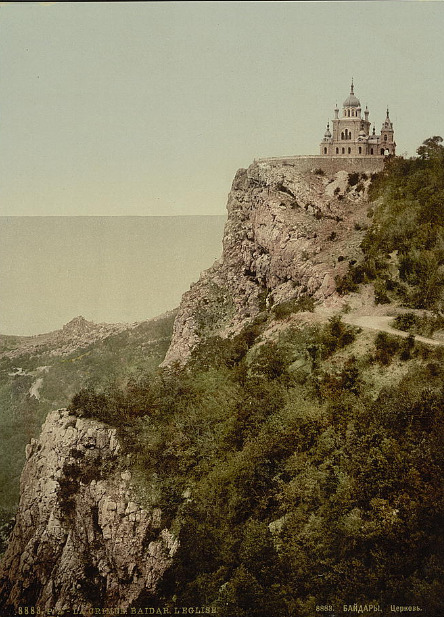
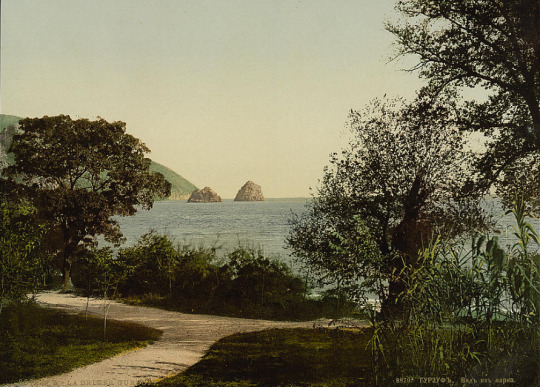
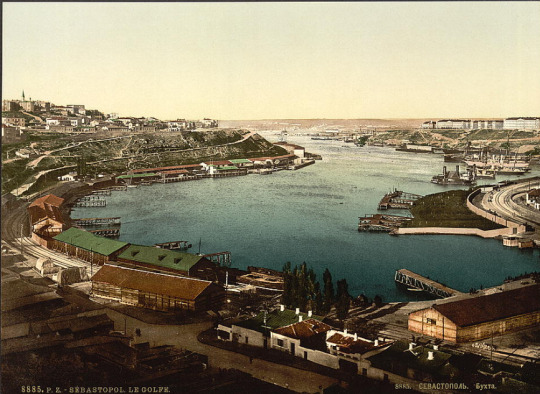


From the boulevard Yalta, the Crimea , Ukraine
2. The gulf, Yalta, the Crimea, Ukraine
3. Gurzuf from the Yalta Road, the Crimea, Ukraine
4. Gurzuf, the Crimea, Ukraine
5. The Crimea, Alupka. The Imperial palace, Ukraine
6. The church, Baidar, the Crimea, Ukraine
7. Gurzuf, from the Park, the Crimea, Ukraine
8. The gulf, Sebastopol, Ukraine
9. The Khan's palace, Bakhchysaraĭ, Ukraine
10. The harem, Bakhchysaraĭ, Ukraine
Photos were published between 1890 and 1900 and are part of The Photochrom Print Collection, which has almost 6,000 views of Europe and the Middle East and 500 views of North America. Published primarily from the 1890s to 1910s, these prints were created by the Photoglob Company in Zürich, Switzerland, and the Detroit Publishing Company in Michigan. The richly colored images look like photographs but are actually ink-based photolithographs, usually 6.5 x 9 inches.
Source https://www.loc.gov
#ukraine#eastern europe#photography#vintage photography#xix century#19th century#crimea#color photography#architecture#cities
263 notes
·
View notes
Text
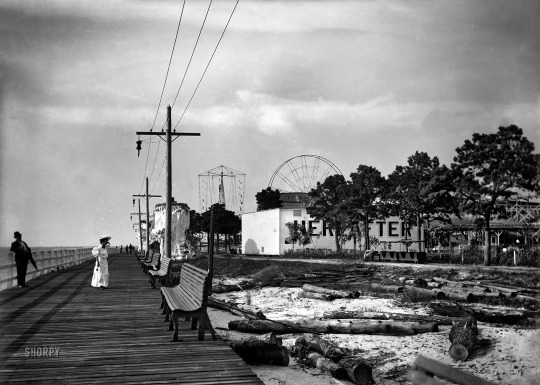
Norfolk, Virginia, circa 1906. Pine Beach, amusements and boardwalk. 5x7 inch dry plate glass negative, Detroit Publishing Company.
26 notes
·
View notes
Text

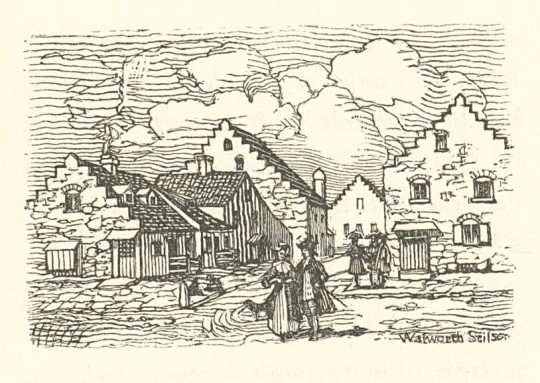



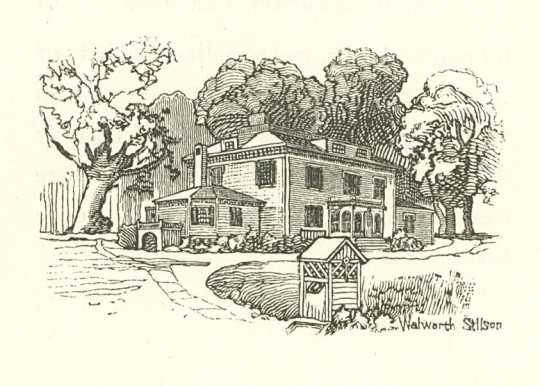

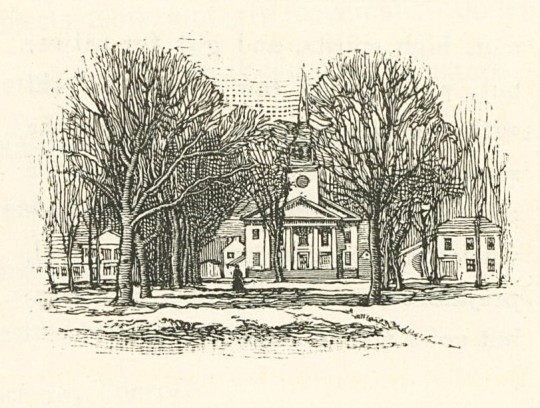



Wood Engraving Wednesday
WALWORTH STILSON
The Writers of Knickerbocker New York is an essay on the Knickerbocker Group of writers by American essayist Hamilton Wright Mabie (1846-1916). The Knickerbocker Group included such writers as Washington Irving, James Fenimore Cooper, William Cullen Bryan, James Kirke Paulding, Fitz-Greene Halleck, Joseph Rodman Drake, Robert Charles Sands, Gulian Crommelin Verplanck, and Nathaniel Parker Willis, all of whom are discussed in Mabie's essay, which was published in 1912 by The Grolier Club of New York in an edition of 303 copies.
For the publication, the Club commissioned American artist Walworth Stilson (1874-1962) to produce these eleven wood-engraved head and tail pieces for each of the book's chapters. Surprisingly little is known about Stilson and his career beyond his immediate family, his 2-year attendance at the Detroit School of Art, his work as an illustrator only up to 1912, a studio fire some time before 1925, and his death in 1962; a remarkable lack of information for a man who lived to be 88 years old. Still, we find these engravings to be quite charming.
Our copy, another gift from our friend Jerry Buff, who is also a Grolier Club member, bears bookplates from two other notable collectors:
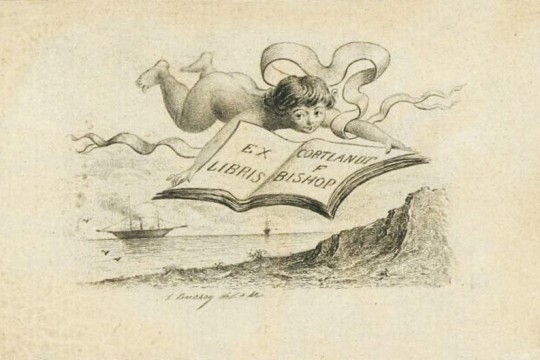
The American adventurer and book collector Cortlandt F. Bishop (1870-1935);

and Harold Hugo (1910-1985), longtime administrator and president of the Meriden Gravure Company and a board member of the Stinehour Press since its founding in the 1950s. Hugo's bookplate is a wood engraving by noted South African-born British calligraphic wood engraver Leo Wyatt (1909-1991), who has signed the plate.
View more posts with books donated by Jerry Buff.
View more posts with wood engravings!
#Wood Engraving Wednesday#wood engravings#wood engravers#Walworth Stilson#The Writers of Knickerbocker New York#Knickerbocker Group#The Grolier Club#Grolier Club#Jerry Buff#Cortlandt F. Bishop#Harold Hugo#Leo Wyatt#bookplates
37 notes
·
View notes
Text

Ave Maria, 1907
Painted by Douglas Volk
Photographed by Detroit Publishing Company, c. 1912
#art#painting#fine art#classical art#american art#american artist#american painter#portrait#female portrait#photography#black and white#beauty#20th century art#1900s
38 notes
·
View notes
Text
This day in history

TODAY (Sept 24), I'll be speaking IN PERSON at the BOSTON PUBLIC LIBRARY!

#15yrsago British Airways adds a “fly next to your children” fee http://news.bbc.co.uk/2/hi/uk_news/8274200.stm
#15yrsago Al Franken reads the Fourth Amendment to DoJ official at PATRIOT Act hearings https://washingtonindependent.org/60611/al-franken-reads-the-4th-amendment-to-justice-department-official/
#10yrsago Insecure printer firmware hacked to play Doom https://www.wired.com/2014/09/doom-printer/
#5yrsago Son of Ghostnet: the mobile malware that targets Tibetans abroad https://citizenlab.ca/2019/09/poison-carp-tibetan-groups-targeted-with-1-click-mobile-exploits/
#5yrsago A list of companies that contract with ICE https://memex.craphound.com/2019/09/24/a-list-of-companies-that-contract-with-ice/
#5yrsago 45 Google whistleblowers tell tales of workplace retaliation after reporting abuse https://www.vice.com/en/article/45-google-employees-explain-how-they-were-retaliated-against-for-reporting-abuse/
#5yrsago Dynasties: in-depth reporting on the wealthy, influential political and corporate families that not-so-secretly rule Canada https://memex.craphound.com/2019/09/24/dynasties-in-depth-reporting-on-the-wealthy-influential-political-and-corporate-families-that-not-so-secretly-rule-canada/
#5yrsago At the UN, Greta Thunberg excoriates world leaders and her elders for climate inaction https://www.youtube.com/watch?v=qWEpTok6AJo
#5yrago Trial begins for the “cum/ex” bankers accused of stealing €447m and trying for €60b https://www.theguardian.com/business/2019/sep/20/the-men-who-plundered-europe-city-of-london-practices-on-trial-in-bonn
#5yrsago Here’s how to take Wired’s advice and get your own e-scooter, for a fraction of the cost https://memex.craphound.com/2019/09/24/heres-how-to-take-wireds-advice-and-get-your-own-e-scooter-for-a-fraction-of-the-cost/
#5yrsago Permanent Record: Edward Snowden and the making of a whistleblower https://memex.craphound.com/2019/09/24/permanent-record-edward-snowden-and-the-making-of-a-whistleblower/
#5yrsago Annalee Newitz’s “Future of Another Timeline”: in which punk feminist time travelers battle Men’s Rights Advocates who want to stop feminism from every emerging https://memex.craphound.com/2019/09/24/annalee-newitzs-future-of-another-timeline-in-which-punk-feminist-time-travelers-battle-mens-rights-advocates-who-want-to-stop-feminism-from-every-emerging/
#5yrsago Nerf unveils “DRM for darts” https://memex.craphound.com/2019/09/24/nerf-unveils-drm-for-darts/
#5yrsago Far-right Australian billionaire demands $500k and a vow of silence from a satirical vlogger https://gizmodo.com/billionaire-threatens-to-sue-youtuber-for-calling-him-f-1838392409
#1yrago Joe Biden is headed to a UAW picket-line in Detroit https://pluralistic.net/2023/09/24/joe-biden-is-headed-to-a-uaw-picket-line-in-detroit/

Today, Tor Books publishes SPILL, a new, free LITTLE BROTHER novella about oil pipelines and indigenous landback!

16 notes
·
View notes
Text

ALICE RANDALL, on how she became a country music writer at the age of 23
Well, I decided to become a Black country songwriter and publisher. I was founding Midsummer Music because I was born in Detroit City in 1959, at the same year as Motown Records, and my father did not read books to me. He told me stories, and one of the stories he told me over and over was the founding of Anna Records that Barry Gordy's sisters had founded a year before Motown.
So he talked to me about women being song publishers and record company executives and songwriters, and I heard those stories and followed in Anna's footsteps.
On writing country melodies
I teasingly say that my melodies are so simple that when the ones I come up with, if I can sing them, the whole world can sing them, so it goes well for having hit sometimes. But I came to Nashville via Harvard in Washington, DC so I sort of took the skills that I learned analyzing the Harlem Renaissance poets and Shakespeare and Jane Austen, and I applied them to country lyrics. I love British metaphysical poetry and American metaphysical poetry, and it was alive and it was alive and hiding in country and western music, and I found it.
On race in the country music industry
The racial fault line in country is all around that theme of the past is better than the present. In much of white country, the past that is better than the present is a mythologized Dixie. In much of Black Country, the past that is better than the present, is a time in childhood where your parents were able, against all odds, to protect you, or a lost Africa before colonization that's manifest by nature.
On what makes a country song, country
Well, the equation is Celtic, that's English, Irish, Scottish ballot forms, plus African influences, plus evangelical Christianity equals country music. Don't have the Black influences, and you probably got folk music. Don't have the evangelical Christianity, and you may have blues.
It's emotional, and they're themes, the big themes of country, as far as I see it. Life is hard, God is real, the road, family, and liquor are significant compensations, and the past is better than the present.
On metaphors
Well, these lyrics, these really complicated lyrics such as, ‘Drop kick me, Jesus, through the goalpost of life,’ that's an extended metaphysical conceit. And you know what? On Beyoncé’s new album, Cowboy Carter, Bodyguard is another one of those extended, complex metaphors that we see all through country.
On Black women in country music
I feel actually a Juneteenth, which is good news at long last. Because I will be 65 May 4th, and I have been in country and western music for 41 years professionally.
When I arrived here in 1983, Charlie Pride had been to the number one spot 29 times. It was about to go up for another time. So many Black men have gotten to the number one spot.
I can't remember all their names, but literally not one Black woman performer had gotten there. There's a phrase I want to say, cultural redlining. Black women have been culturally redlined out of that.
They had not been given the economic resources to make the campaign to get there. And Beyoncé eclipsed all of that. And I can retire now with a joy that all three of the things I wanted to see, they got done.
One came in right at the last moment, wouldn't have gotten there without Queen B.
On representation and the first time she heard one of her songs performed by Adia Victoria, a Black woman
I cried. I cried. Just thinking back on it right now almost makes me cry again.
It changed the whole beginning of my book, because I knew I had to start with that moment. Over the years, I've been honored, and I tell the story. Glenn Campbell, Moe Bandy, Radney Foster, Tricia Yearwood, so many extraordinary stars had sung my songs.
But no one had ever looked like me had sung one of my songs. And more significantly, listeners thought all the heroes and sheroes in my songs were white, because the singers were white. And some of those heroes and sheroes, I had imagined them, all of them I had imagined as Black.
And I was willing and embraced people projecting their identities onto them, but I resisted the identities I had originally imagined and created being erased. And Adia Victoria added the color back to that cowboy. And 20 to 30% of all cowboys in the American West were Black and Brown, and they deserve to be remembered.
And if we don't remember them, we cannot properly encounter Cowboy Carter.

#alice randall#politics#music#country music#my black country#beyonce#cowboy carter#black country#texas holdem
24 notes
·
View notes
Text

I have been away, and I'm about to step out again for even more adventures. New posts will resume in a few weeks.
This vintage postcard is adapted from an image in the digital collections of the New York Public Library. The original was produced sometime between 1898 and 1931 by the Detroit Publishing Company. If you have ever stood on the Grand Canyon's rim you know the futility of capturing the expansive view with a photograph, so you might as well make your postcard imaginative and fanciful. Pity the poor horses though.
50 notes
·
View notes
Text





1907 postcard series ~ Detroit Publishing Company ~ Samuel L. Schmucker (American artist, 1879–1921)
39 notes
·
View notes
Text

Italian market, Mulberry Street, New York. Between 1900 and 1910
Photo by Detroit Publishing Company,
56 notes
·
View notes
Text
MrBeast's channel now is just him doing "crazy" things with lots of money.
And I mean "crazy" the way people who liked Young Sheldon might use that word. Like, omg, so much charity dental work! Airplane! Terrible candy bars he licensed from a generic bad candy bar company! Complicated game show pop culture reference, that ruined people's lives! Paying people to interact with children and then never supervising them, like at all!
What is this suburban church youth group shit, Jimmy? You have at least a billion dollars. You need to get out of this lame middle class hole you've fallen into. You're a GOD now, Jimmy. You need to think big.
Here's my recommendation. Get STUPID with it. Drop heavy things from Space onto Canada. Load one train with gasoline and another train with AA batteries and crash them into each other in the desert. Buy a $19 million Bugatti La Voiture Noire, pay some tiny garage to put giant plastic Lego Ice Planet wheels on it, then drive it offroad in Finland and crash it into a lake. Buy everyone in Detroit Bean Boots for Christmas. Everyone. Then deliver them to the unhoused population yourself, dressed as Santa.
Paint all of Pittsburgh, including the trees and trash piles, sky-blue with water-soluble paint. Lash eight semi trucks together and make them pull an accurate scale model of a Roman chariot, that is 30 ft tall. Offer Elon Musk $100 million to let Brock Lesner open-hand slap the plastic surgery out of his stupid square moron head, on camera, on X. Commission and publish your own edition of the Bible with the name Jesus changed to "Spanky Ratshit," and pay Walmart whatever they ask to stock it nationwide. Get permission to flood the Narendra Modi Stadium in Ahmedabad halfway up, then put some real frigates in it. Then hire LARPer pirate crews, train them for a month, and make them battle with a tech-powered pirates' weapon system for a "booty" of $20 million.
Buy half of Montana, and give it to Taylor Swift, on the condition that she has to do a reggae album. With the accent.
Get weird with it, Jimmy. You don't need to do videos entertaining boring children anymore. Create historic events with your money. Do something exciting.
7 notes
·
View notes
Text

Jemele Juanita Hill (December 21, 1975) is a sports journalist from Detroit. She worked for the Raleigh News & Observer, the Detroit Free Press, and the Orlando Sentinel. She joined ESPN in 2006 and worked in various roles until 2013 when she became host of Numbers Never Lie. The show was rebranded to His & Hers which she co-hosted with Michael Smith. They co-hosted SC6 (2017-18).
She sparked a controversy in 2017 with a series of tweets critical of President Donald Trump including describing him as a white supremacist. She was suspended for two weeks for a second violation of ESPN’s social media policy when she suggested fans of the Dallas Cowboys boycott the team’s sponsors in retaliation for Jerry Jones’ stance on players kneeling during the national anthem.
She won an Emmy Award for Outstanding News Special for The President and The People. She left her role as co-host of SC6 and joined the ESPN website, The Undefeated. She left ESPN afterward and works as a contributing writer for The Atlantic. (2020-21), she co-hosted Vice’s Cari & Jemele (Won’t) Stick to Sports.
She is the co-founder of the film and production company Lodge Freeway Media and published her autobiography Uphill: A Memoir in 2022.
She was born in Detroit. She and her mother moved to Houston and back to Detroit. She graduated from Mumford High School and Michigan State University.
She is the co-founder of a film and television production company named Lodge Freeway Media. She played herself in the National Champions. She was cast in Everything’s Gonna Be All White.
She was named Journalist of the Year by the National Association of Black Journalists, in recognition of “a distinguished body of work with extraordinary depth, scope, and significance to the people of the African Diaspora.” She was named one of Worth’s 21 Most Powerful Women in the Business of Sports. She headlined the 2022 Martin Luther King Jr. Cultural Dinner at Illinois State University. #africanhistory365 #africanexcellence
4 notes
·
View notes
Note
Omg I must see how timo and Liv make up? And what role Emma and Luca (maybe even lio) play in the making up. Maybe like something really big and/or exciting happens in Liv’s life and it makes her wish she had her dad around and Timo finds out and wishing he was there for the important moment. And of course starts to like Luca:))
A/N: This one got loooong. Our sweet girl liv 🥺💜
Liv cannot believe the email that she is seeing.
She is going to be a published author! Her first publication is going to be a whole freaking book! She lays back, kicking her feet up in the air. She grabs her phone, rolling onto her stomach as she listens to the FaceTime jingle connect to her mom back home.
“Hello Livy.” Emma murmurs into the phone. It is late, Liv realizes now.
“Oh I’m sorry. Did I wake you?”
“No, dad and I were sitting by the lake. How are you?” Liv tries not to let her smile falter at the mention of her still estranged father.
It’s been months since the summer night Liv left home. In October, Emma had come to parents weekend on her own. Timo flew over with her, but spent all his time with Lio, giving Liv distance. Other than a few, brief moments together at Lio & Luca’s game, Liv continues to keep her dad at an arm’s length.
“I am great. I have news.” She wiggles her shoulders. Emma perks, face expectantly glistening at her daughter. “I’m going to be a published author. My professor submitted my short story collection to a small company in Chicago. They want to do a full, 100+ page collection and publish it!”
“YES!” Emma cheers, jumping up and down. “Of course you are baby! I am so proud of you!” Emma’s eyes drift above the phone, then dart quickly back down to the screen. “So what are the next steps?”
Liv fills her mom in. This is the early stages, but because it is a shorter collection, it can be printed and released within the next 3 months. Right after Liv’s birthday is their target date. As Liv speaks, her mom moves into her office, closing the pocket door behind her.
“How wonderful! Oh, I knew you would reach your goal well before you were done with school.”
“Mama.” Liv chuckles. She is Liv’s biggest fan. The two women chat a little longer before Liv needs to head out to her next class. Before she goes, her mom has one final question.
“Is it okay with you if I tell daddy?” Emma asks, nervously. Liv nods. Despite everything, she wants him to know.
It’s a grueling couple of months. Liv has to learn quickly to balance a long-distance relationship, several rounds of edits and her school work. Several times, she is crying to Luca on the phone that maybe she can’t do this. Maybe she should back out of the book. Luca talks her through every wave of uncertainty.
“You can do this, baby. Don’t worry about us right now. We are solid. Worry about you and your dreams. I’ll see you when I can, okay?”
The problem is, Liv wants to see Luca. And her mom. She really needs a hug from her mom right now.
The night of the book launch, her publisher hosts a party in her honor. It just so happens to coincide with Luca’s schedule, and an off-day when the Wild are playing in Detroit. A quick flight gets him in Liv’s arms for the first time in months, where she refuses to let go of him. Lio is playing in Chicago the next night. It all perfectly came together for her big day.
For once, she is the main focus of the family.
But when her family walks in to the event space, beaming at her, Liv’s heart cracks in her chest. Discouraged tears rush into her eyes as she hugs her mom. Liv knows Timo came with her mom and younger brothers, but he is not here tonight. No one asked if he was invited; they all assumed it would be this way. Liv did too. But now that this is all happening, it feels wrong. Wrong in her heart. Wrong in her soul. Wrong in every rush of aliveness in her being.
She needs her dad.
“We are so proud of you!” Emma squeezes her tight again. “This is only the beginning. Anything you want is within your reach. I know it.” Emma squeezes her hand, then steps aside for hugs from the boys.
Once those squeezes are done, including the half asses ones from the twins, Liv grabs her mom’s forearm.
“Mama, can we talk?”
“Of course.” The two women leave the boys to talk shop aka hockey. “What’s up?” Liv swallows hard, looking into her mom’s brown eyes.
“Ah… What is daddy doing right now?” Emma straightens, pausing to read every flicker of Liv’s face.
“Um, he’s… at the hotel.”
“The four seasons?”
“Yes.”
“What room?”
“419.”
“Okay. I’ll be back.”
“Okay.” Emma whispers in awe. She thinks about warning Timo briefly, but ultimately, this is not her place.
Liv’s teeth chatter the entire ride to the hotel in the passenger seat of Luca’s rental car. His hand on her thigh is the only thing preventing her from clattering off the seat to the floor mats. She keeps trying to pull in deep, calming breaths. When Luca pulls into the valet, he pauses, putting the car in park.
“Do you want me to come in?”
“No.. well.. yes.. No.” She shakes her head, unclipping her seatbelt. The valet opens her door. She swallows hard. “Could you just wait in the lobby?”
“Yes. Whatever you need, babe.”
“Thank you.” She whispers.
They walk hand in hand to the elevators. Liv’s fingers reluctantly leave his.
“I’m right here.” Luca reminds her as the doors close, separating them. When they steel presses together, her anxious expression looks back at her. She had her make up professionally done. She looks so much like her mom, so beautiful and elegant. The doors open and she walks to the left. Their room is in the corner, at the end of the hall. Before she can talk herself out of it, she knocks.
“Baby, did you forget your… purse.” Timo asks, holding up her mom’s black bag. Timo freezes when he realizes she is not Emma. He is dressed to the 9s in his best, blue suit. A shiny black bowtie is perfectly arranged at the opening of his neck. His loafers are shined, ankles exposed, and hair perfectly slicked into place. He looks dressed for the exact kind of event she came from.
“Um, no, but we can bring that to her.” Liv blurts. She can hear her blood pounding through her body.
“Hi Liv.” Timo says.
“Hi.”
“What… ah… are you doing here? Did mama send you for her purse?” His eyebrows pull together in confusion. “I could have brought it. But I thought maybe I’m on a certain black list. Wouldn’t be the first time.” He adds a half-hearted chuckle. Liv folds her bottom lip into her mouth.
“No, I don’t think mama knows she forgot her purse.”
“Oh. Well here.” Timo awkwardly extends the YSL shoulder bag out by it’s gold chain. Liv tentatively takes it, letting it rest in her hands in front of her. They stare at each other, not quite believing they are breathing the same air. Liv has darker hair than before. She always loses her summer highlights in the winter. Her brown hair is deep and rich like her mom’s. She’s so beautiful; Timo can’t believe she’s half him. “So, why are you here?”
“I was having a great night tonight. At least I thought I was. But then mama and the boys walked in without you and, I felt so.” She pauses, licking her dry lips and swallowing to ease the static in her throat. “So incomplete.” Timo’s eyes drop to the floor. “I don’t want this night to happen without you. It won’t mean as much. Everyone important is in that room, except for you.”
“Sweetheart, if mama told you I was sad earlier and you feel like you have to invite me, you don’t. I don’t deserve to be there.”
“I am not here because of mama. I know we have a lot to talk about, but I really want you there with us. Will you come back with me?”
“Yes.” The rush of air from Timo is immense. He sucks in a shaky breath after, trying like hell not to break down into sobs. “Of course. Thank you. Liv, this means.. so much to me.” Timo turns to go back into the room. “I’ll grab my wallet and we can go.”
“Okay. You should know Luca is downstairs. He brought me here.”
“Okay. That’s great.” Timo nods, searching under his clothes, trying to find his wallet. “Here it is.” Timo chuckles. “Your mom still insists I need a chain on this but… yuck.” He shake his head.
“Not fashionable at all.” Liv smiles, knowing her dad’s preferences all revolve around the season’s hottest trends coming out of Italy. Timo puts it in the inner pocket of his suit jacket as he looks at his daughter.
“Livy I am so proud of you. And I love you so much.”
“Do you?” Liv whispers. Timo’s face shatters, cheeks tight with emotion.
“Yes. Every day of your existence. I used to cry at the mere thought of you in my arms when you were in mama.” Liv knows this. She’s seen the videos her mom took of him wiping his wet cheeks. “Although I know I have not gone about this the best, every thing I’ve done has been with your best interest in mind… keeping you safe too. But you are grown up now. You’re way smarter than me and it’s your life. I respect that.”
“Daddy, Luca and I are in love.” Liv says as she steps towards him, putting herself into his arms.
“I know, hon. Mama told me.” Timo responds. “Heard about your birthday too… The celebration you always deserve.” He trails off. “Sorry I missed another one.”
“You’ll come over next year?”
“Of course. Wouldn’t miss it.” Liv rests her cheek on his chest, closing her eyes as he hugs her close.
“Are those the cuff links I gave you?” She wonders after they separate.
“Yeah.” Timo chuckles, bringing his wrist up for her to see.
“Remember when I thought those were just my initials?” She grins, looking up at him.
“Yeah…. Your mom and I couldn’t think past L I guess. Sorry about that.”
“It’s okay, you kept me as the only girl and that seems better.”
“Our perfect girl.” Timo murmurs. “Let’s go. I wanna tell everyone all about you being my daughter.”
Timo and Liv head down to the lobby where Luca waits for them. He grins wide when he sees the two Meiers walking towards him. Liv is so happy. Her arm is laced through Timo’s and they laugh about Emma forgetting her purse and still not realizing it. Timo’s smile stays even when he sees Luca.
“Are we ready to go back?” Luca asks.
“Yeah. We are all here now.”
“Hi, I’m Timo, Liv’s dad. It’s nice to meet you.” Timo grins. Luca laughs, shaking his hand solidly, while going along with it.
“I’ve heard a lot about you. You should know I keep my hands to myself, sir.”
“I’m sure you do.” Timo chuckles.
“Really?” Liv asks Luca.
“It’s funny. We’re laughing, no?” Luca laces their fingers together then opens the door for Liv so she can walk through first. It takes everything in Luca to not let his eyes drift to the sweet curve of her ass in that dress.
Things with Timo may have calmed, but Luca knows better than to press his luck any further tonight.
Plus, tonight isn’t about any of them, it’s about Liv. And she deserves the best.
28 notes
·
View notes
Text

Pearl Street from State Street, Albany, New York 1914. 8x10 inch glass negative, Detroit Publishing Company.
26 notes
·
View notes